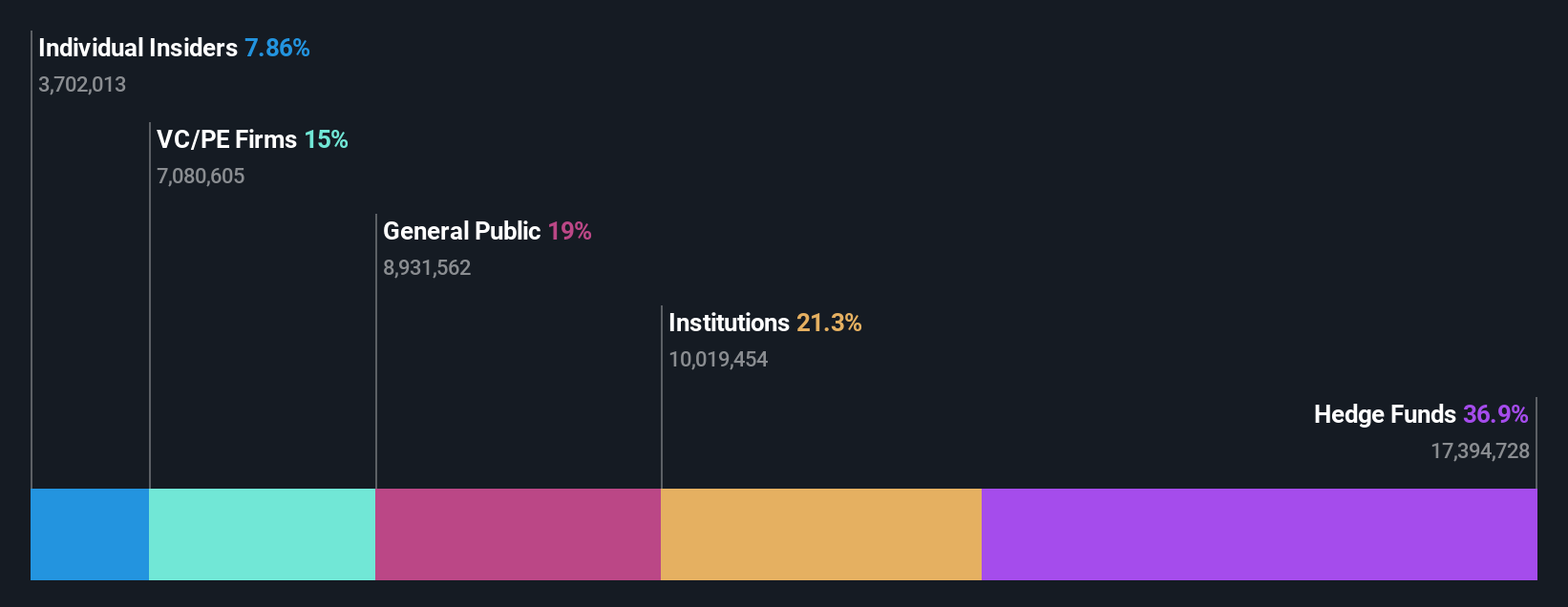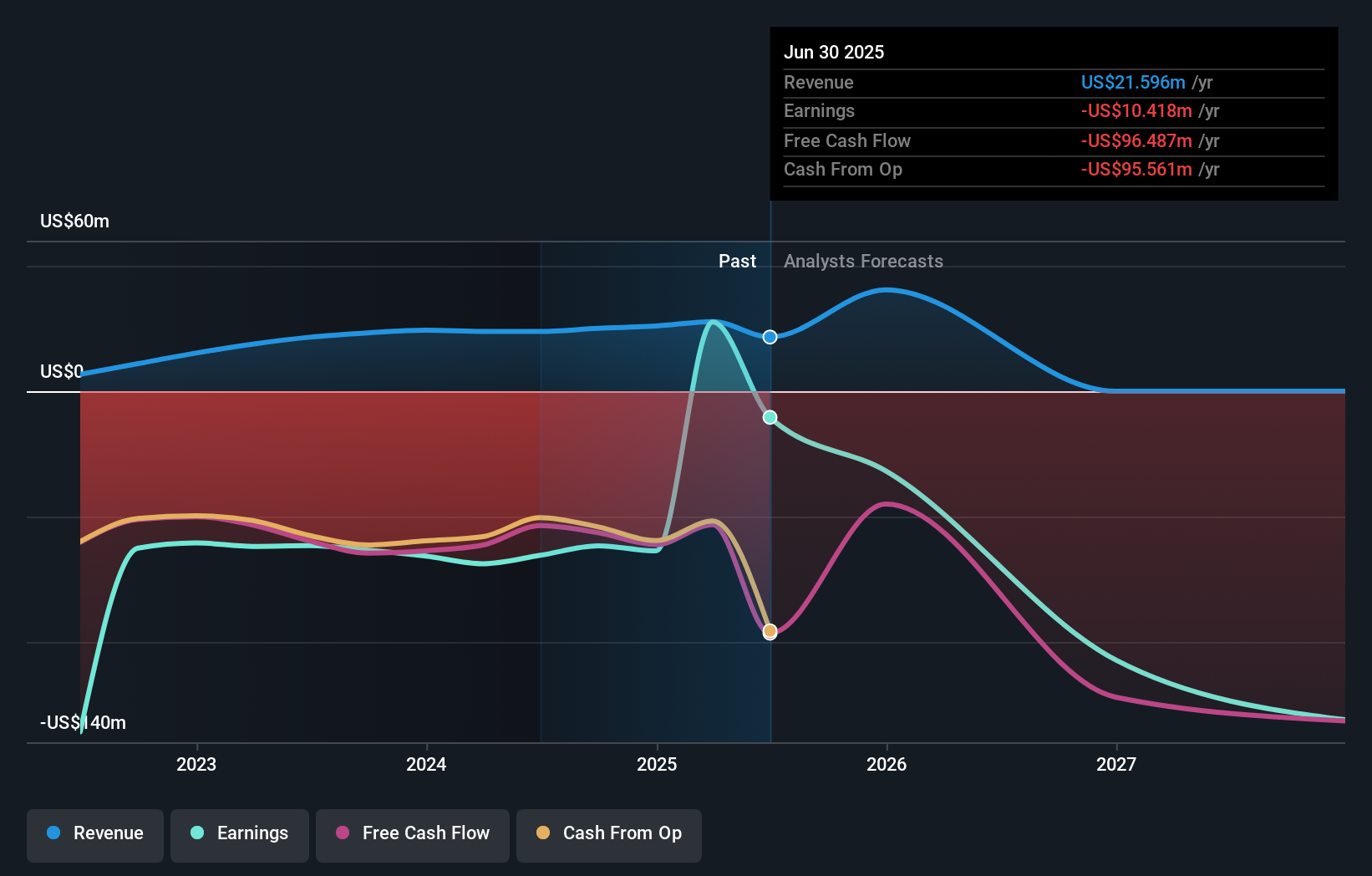- United States
- /
- Biotech
- /
- NasdaqCM:WHWK
Whitehawk Therapeutics, Inc.'s (NASDAQ:WHWK) large hedge funds owners must be happy as stock continues to impress, up 17% over the past week
Key Insights
- Institutions' substantial holdings in Whitehawk Therapeutics implies that they have significant influence over the company's share price
- A total of 7 investors have a majority stake in the company with 52% ownership
- Analyst forecasts along with ownership data serve to give a strong idea about prospects for a business
A look at the shareholders of Whitehawk Therapeutics, Inc. (NASDAQ:WHWK) can tell us which group is most powerful. And the group that holds the biggest piece of the pie are hedge funds with 37% ownership. In other words, the group stands to gain the most (or lose the most) from their investment into the company.
And as as result, hedge funds investors reaped the most rewards after the company's stock price gained 17% last week. The gains from last week would have further boosted the one-year return to shareholders which currently stand at 14%.
Let's take a closer look to see what the different types of shareholders can tell us about Whitehawk Therapeutics.
View our latest analysis for Whitehawk Therapeutics

What Does The Institutional Ownership Tell Us About Whitehawk Therapeutics?
Institutions typically measure themselves against a benchmark when reporting to their own investors, so they often become more enthusiastic about a stock once it's included in a major index. We would expect most companies to have some institutions on the register, especially if they are growing.
Whitehawk Therapeutics already has institutions on the share registry. Indeed, they own a respectable stake in the company. This can indicate that the company has a certain degree of credibility in the investment community. However, it is best to be wary of relying on the supposed validation that comes with institutional investors. They too, get it wrong sometimes. When multiple institutions own a stock, there's always a risk that they are in a 'crowded trade'. When such a trade goes wrong, multiple parties may compete to sell stock fast. This risk is higher in a company without a history of growth. You can see Whitehawk Therapeutics' historic earnings and revenue below, but keep in mind there's always more to the story.

It would appear that 37% of Whitehawk Therapeutics shares are controlled by hedge funds. That's interesting, because hedge funds can be quite active and activist. Many look for medium term catalysts that will drive the share price higher. QVT Financial LP is currently the largest shareholder, with 9.8% of shares outstanding. In comparison, the second and third largest shareholders hold about 8.8% and 7.9% of the stock.
On further inspection, we found that more than half the company's shares are owned by the top 7 shareholders, suggesting that the interests of the larger shareholders are balanced out to an extent by the smaller ones.
While studying institutional ownership for a company can add value to your research, it is also a good practice to research analyst recommendations to get a deeper understand of a stock's expected performance. Quite a few analysts cover the stock, so you could look into forecast growth quite easily.
Insider Ownership Of Whitehawk Therapeutics
While the precise definition of an insider can be subjective, almost everyone considers board members to be insiders. Management ultimately answers to the board. However, it is not uncommon for managers to be executive board members, especially if they are a founder or the CEO.
Insider ownership is positive when it signals leadership are thinking like the true owners of the company. However, high insider ownership can also give immense power to a small group within the company. This can be negative in some circumstances.
We can see that insiders own shares in Whitehawk Therapeutics, Inc.. As individuals, the insiders collectively own US$8.0m worth of the US$101m company. This shows at least some alignment, but we usually like to see larger insider holdings. You can click here to see if those insiders have been buying or selling.
General Public Ownership
With a 19% ownership, the general public, mostly comprising of individual investors, have some degree of sway over Whitehawk Therapeutics. While this group can't necessarily call the shots, it can certainly have a real influence on how the company is run.
Private Equity Ownership
With a stake of 15%, private equity firms could influence the Whitehawk Therapeutics board. Sometimes we see private equity stick around for the long term, but generally speaking they have a shorter investment horizon and -- as the name suggests -- don't invest in public companies much. After some time they may look to sell and redeploy capital elsewhere.
Next Steps:
While it is well worth considering the different groups that own a company, there are other factors that are even more important. For instance, we've identified 3 warning signs for Whitehawk Therapeutics (2 can't be ignored) that you should be aware of.
But ultimately it is the future, not the past, that will determine how well the owners of this business will do. Therefore we think it advisable to take a look at this free report showing whether analysts are predicting a brighter future.
NB: Figures in this article are calculated using data from the last twelve months, which refer to the 12-month period ending on the last date of the month the financial statement is dated. This may not be consistent with full year annual report figures.
Valuation is complex, but we're here to simplify it.
Discover if Whitehawk Therapeutics might be undervalued or overvalued with our detailed analysis, featuring fair value estimates, potential risks, dividends, insider trades, and its financial condition.
Access Free AnalysisHave feedback on this article? Concerned about the content? Get in touch with us directly. Alternatively, email editorial-team (at) simplywallst.com.
This article by Simply Wall St is general in nature. We provide commentary based on historical data and analyst forecasts only using an unbiased methodology and our articles are not intended to be financial advice. It does not constitute a recommendation to buy or sell any stock, and does not take account of your objectives, or your financial situation. We aim to bring you long-term focused analysis driven by fundamental data. Note that our analysis may not factor in the latest price-sensitive company announcements or qualitative material. Simply Wall St has no position in any stocks mentioned.
About NasdaqCM:WHWK
Whitehawk Therapeutics
An oncology therapeutics company that develops technologies to establish tumor biology for cancer treatments.
Flawless balance sheet with slight risk.
Market Insights
Community Narratives



